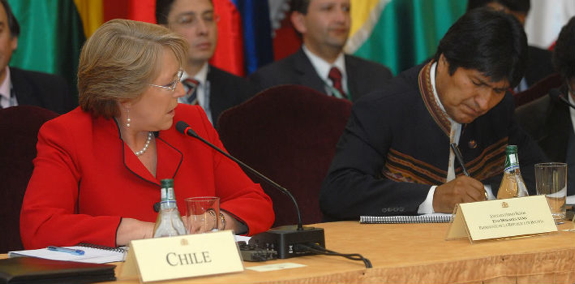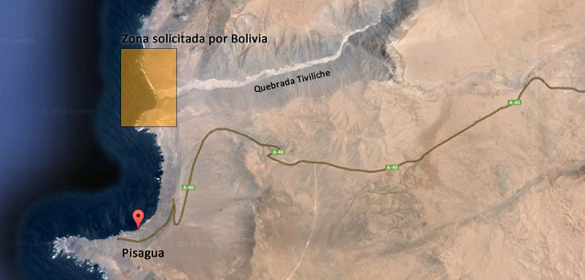
(above) Bolivia-Chile relations have been soured by a long-running dispute over Bolivia's claim to sovereign ocean access. (Radio Chile)
Morales Slams Bachelet as "Fake Socialist" amid Border Dispute
February 20, 2015 - PanAmPost
Court Announces May Hearings, Tensions Boil Over
Sabrina Martín
Simmering tensions between Bolivia and Chile have spiked after an announcement by the International Court of Justice (ICJ) that it will hear their initial arguments over Bolivia's claim to sovereign access to the sea via Chile on May 4.
In a radio interview on Wednesday, February 18, Bolivian President Evo Morales described former Chilean President Salvador Allende (1970-73) as a "genuine socialist … unlike the fake socialists [in power] today in Chile."
Bolivian daily La Razón reported that government minister Hugo Moldiz supported Morales's claims, lamenting that Chilean President Michelle Bachelet was a "prisoner of an anti-Bolivian policy" and "far-right sectors," and insisting that the demand submitted by the landlocked country to The Hague "has a historical and legal foundation."
Chilean Foreign Minister Heraldo Muñoz meanwhile responded to the Bolivian remarks via Twitter:
"President Morales says Allende was a genuine socialist. True, but Allende never negotiated on [access to] the sea and defended the principle of respect for treaties."
Chilean Socialist Party (PS) President Osvaldo Andrade also commented on Morales's remarks. "His problem is that he has to build up enemies like the neighborhood bully, because the day that he doesn't have enemies he loses his role … so he plays the victim," Andrade told El Mercurio.
ICJ Hearing Approaches
The latest spat in the long-running dispute emerged on February 16 after the ICJ set the date for the initial round of statements by Chile and Bolivia on the issue of maritime access.
Chilean representatives will deliver their first round of statements on May 4, with Bolivia taking its turn on May 6. The second round is set to take place on May 7 and 8.
February 18 was fixed by the ICJ as a cut-off point for Chile to present written objections to the Bolivian demand. However, Chile's ambassador to the Netherlands, María Teresa Infante, explained that Chile would not hand in further written statements, having already submitted a preliminary objection in July 2014 which Bolivia answered successfully.
The Chilean objection came in the same month as Bolivia handed in written arguments explaining the basis of its judicial claim against Chile. Bolivia asked the Court to recognize a sovereign access route to the sea via Chilean territory, and to issue a ruling on Santiago's obligation to negotiate "in good faith" over the issue after over 100 years of inconclusive dialogue.
After May's public hearings, the ICJ will issue a ruling on whether it is competent to judge the demand. If the Court delivers a positive ruling, the legal arguments will begin in earnest.
(below) The zone that Bolivia allegedly requested from Chile in return for dropping its ICJ claim. (Biobiochile)

Historic Grudge
In January 2015, Morales vigorously denied having privately offered to withdraw the ICJ complaint in return for Chile ceding a sovereign enclave on its coastline.
"Bolivians aren't stupid. To give up the demand for a piece of earth … our demand is well underway, we are very respectful of international organizations," Morales told press. "Bolivia maintains a single policy, a single posture, and the same course. Here, we're united."
Bolivia filed its ICJ claim in April 2013, following decades of fruitless negotiation over its access to the Pacific Ocean, which it lost along with the Atacama region to Chile in the War of the Pacific (1879-83). The Andean country insists that it doesn't seek to redraw borders, but rather to force Chile to negotiate sovereign access to the sea for Bolivian citizens and goods.
Chile has meanwhile argued that the ICJ isn't competent to judge the demand, citing a 1904 border treaty between the two countries that it claims takes precedence. Chilean officials have also argued that Bolivian exports enjoy tax exemptions in Chilean ports, including free storage for up to a year, which are extended not even to Chilean businesses.
In 2011, then-President Sebastián Piñera asserted that Chile's first condition for "concrete dialogue with Bolivia is full and total respect for the 1904 treaty," after Morales asked the Chilean premier to present a "concrete proposal" to help resolve the Bolivian demand.
The issue has been a consistent obstacle to closer ties between the neighboring countries. Diplomatic relations have been maintained at consular level only since 1962, when both withdrew their ambassadors.
Translated by Laurie Blair. Edited by Guillermo Jimenez.